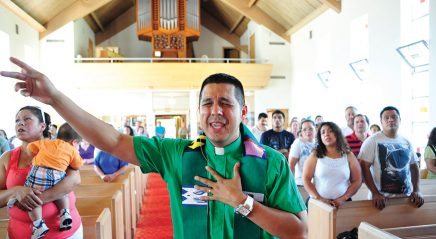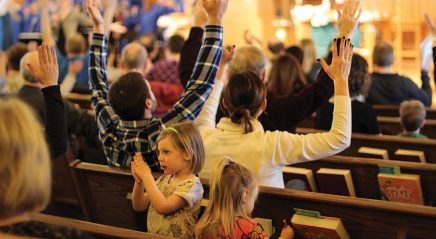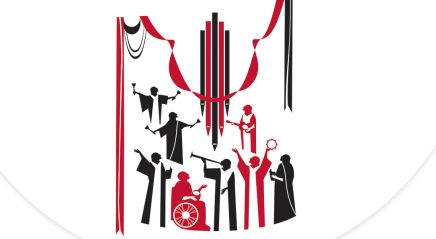Editor’s note: This piece originally ran on June 6, 2o19. Our June 2019 cover story, “Worship 101,” examined the “whats, whys and hows” of ELCA worship. We continued the story as a monthly online series further exploring what Lutheran worship is, how Lutherans worship and why we do so.
The Day of Pentecost has come, and we as a church continue to gather in community. Suddenly come the sounds of organs, pianos, guitars, drums, percussion, strings, brass and woodwinds, filling the sanctuaries. People sing, full of the breath of God, in languages, rhythms and melodies from around the world, ancient and new.
Now people from every nation under heaven are together, worshiping. And at this collective sound, the gathered crowds are bewildered—each hears the music of their own heart. Amazed and astonished, they ask, “Are not all these Lutherans? How is it that we hear this, each of us, in the music indigenous to our souls?” All are amazed and perplexed, saying to one another, “What does this mean?”
Is this an impossible dream? An unattainable vision? Or is this what the Spirit can do in our midst if we take a deep breath and let it infuse our worship? Can we experience this in our home congregations?
Perhaps we can’t offer all things for all people, but we have so much available at our fingertips that it would be a shame to pin ourselves down to one particular style. God is, and has been, working through faithful musicians, composers and liturgists from myriad traditions to edify our faith and worship. I fear that some communities synthesize the Spirit right out of worship by trying to keep unnecessary boundaries on the style of music used within one worship service. And, I must add, the more rigid the boundary on what music style is used, the closer it gets to resembling a golden calf.
In worship, we give shape to our communal image of God. If you only ever worship using one musical style, you limit your capacity to paint a full image of God. Each song, instrument and rhythm has the capacity to reveal a new aspect of God to the worshiper.
In worship, we give shape to our communal image of God. If you only ever worship using one musical style, you limit your capacity to paint a full image of God.
God is big and powerful, full of breath, deep and ethereal, like an organ. But God also dances with rhythm, enthusiasm and passion in a way that can only be expressed with a guitar and Latin percussion. God is soft and gentle like a sweet melody sung with a harp and has an all-consuming presence that can be felt through a full praise band. God is beyond time, like a Taizé hymn sung past the point of counting. And God is powerfully disruptive, like songs of protest. God is paradoxically improvisational and communal, like gospel music or tight-knit like a barbershop.
Do we all, then, need to become musical savants, capable of doing every form of music in worship? No.
My point is that Pentecost is here—not just once a year, but every day. The Spirit has been loosed on the world, manifesting in songs of faith in every form and style, language and rhythm. For those who curate worship on a weekly basis, this is an opportunity to look beyond the self and find God in the unexpected; to look past what is comfortable and to be stretched by the gifts of the Spirit. For those who come to worship, it’s an opportunity to experience God beyond our understanding: a God who works in “our” culture (whatever “ours” is for you) as well as “their” culture (whatever “theirs” is for you).
We all have an opportunity today, in a world more connected than ever before, to experience Pentecost in every worship service. This experience may even help people see and realize that our church has already become the church of the Pentecost vision described above.
It may be smart to start slow and introduce things intentionally with your congregation—but the time is now. We need to stop segregating worshipers based on their preferred music style and open them up to the work of the Spirit. It may even cause some to sneer and say, “They are filled with new wine” (Acts 2:13). To this you will have to get up and say, “We are not drunk, as you suppose, for it is only 9 a.m. No, this is the work of the Holy Spirit declaring the fullness of God in Jesus Christ through word and song.”








